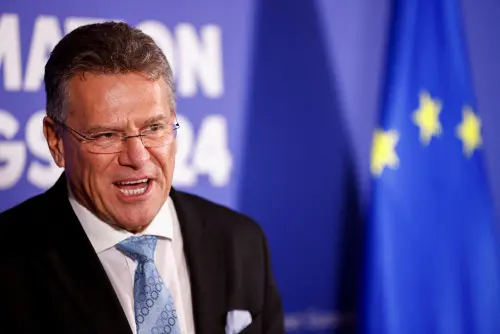The European Union's trade commissioner Maros Sefcovic met with U.S. President Donald Trump's top trade officials to attempt to prevent significant tariffs on EU goods. The outcomes of these discussions remain unclear.
Sefcovic described his meetings with Commerce Secretary Howard Lutnick, U.S. Trade Representative Jamieson Greer, and senior White House economic adviser Kevin Hassett as "substantive." Previous discussions had not altered Trump's plans to increase U.S. import duties to align with rates charged by major trading partners and to address non-tariff trade barriers.
"The hard work goes on. The EU's priority is a fair, balanced deal instead of unjustified tariffs," Sefcovic stated, emphasizing a shared goal of industrial strength on both sides.
A spokesperson for the USTR did not comment on the discussions. These meetings occur as some countries prepare tariff concessions in advance of Trump's April 2 announcement regarding the reciprocal tariff plan.
Reports indicate that India is open to reducing tariffs on more than half of its imports from the U.S., valued at $23 billion, as part of an initial phase. India currently has one of the highest trade-weighted average tariff rates at 12.1%, in contrast to the U.S. rate of 2.5%.
An aide to the U.S. Trade Representative is in New Delhi for trade talks with Indian officials throughout the week. Trump indicated a willingness to provide "a lot of countries" with breaks on tariffs, although he did not provide specifics. He also mentioned that additional tariffs on autos, pharmaceuticals, and aluminum are forthcoming.
EU officials have faced challenges in persuading Trump to reconsider his trade war approach as he initiates a multi-front tariff strategy likely to provoke strong retaliatory measures. Sefcovic noted that there has been little progress in discussions following the imposition of 25% tariffs on steel and aluminum imports.
"We must make every effort to avoid harmful tariffs and foster the EU-U.S. trade relationship, which is the strongest in the world," European Commission spokesman Olof Gill commented.
Sefcovic has indicated the EU's willingness to discuss lowering automotive tariffs across the Atlantic, including the EU's 10% car tariff and the U.S.'s 25% truck tariff.
Canadian Prime Minister Mark Carney warned that Canada is ready to introduce retaliatory measures against the U.S., depending on the actions taken by Trump on April 2. Trump has also threatened to end the temporary tariff reprieve for goods compliant with the U.S.-Mexico-Canada free trade agreement. However, Carney expressed that Canada would not rush into negotiations and wants "substantive discussions" among sovereign nations, highlighting the importance of negotiating as equals.
White House officials cautioned that countries seeking early tariff relief might not completely avoid tariffs, as Trump's calculations will also account for non-tariff barriers and currency policies.
The EU plans to delay its initial counter-measures until mid-April, including a 50% tariff on U.S. bourbon. In retaliation, Trump threatened to impose a 200% tariff on all wines and other alcoholic products from the EU if retaliatory tariffs are enacted.
Trump's officials, including Treasury Secretary Scott Bessent, indicated that the reciprocal tariff focus will prioritize countries with the highest trade surpluses with the U.S., referred to as the "Dirty 15." While they did not name these countries, data indicates that China, the EU, Mexico, and several others hold the largest trade surpluses with the U.S.
The Office of the United States Trade Representative expressed specific interest in submissions for the largest U.S. trade partners and those with the highest goods trade surpluses, highlighting Argentina, Australia, Brazil, Canada, China, the EU, India, and others, which together account for 88% of total goods trade with the U.S.
